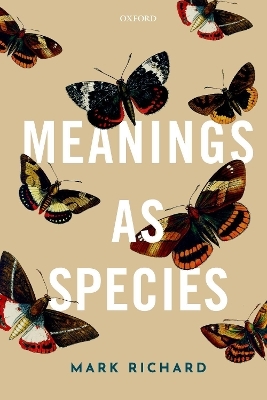
Meanings as Species
Seiten
2021
Oxford University Press (Verlag)
978-0-19-284837-6 (ISBN)
Oxford University Press (Verlag)
978-0-19-284837-6 (ISBN)
Mark Richard presents an original theory of meaning, as the collection of assumptions speakers make in using it and expect their hearers to recognize as being made. Meaning is spread across a population, inherited by each new generation of speakers from the last, and evolving through the interactions of speakers with their environment.
Mark Richard presents an original picture of meaning according to which a word's meaning is analogous to the biological lineages we call species. His primary thesis is that a word's meaning - in the sense of what one needs to track in order to be a competent speaker - is the collection of assumptions its users make in using it and expect their hearers to recognize as being made. Meaning is something that is spread across a population, inherited by each new generation of speakers from the last, and typically evolving in so far as what constitutes a meaning changes in virtue of the interactions of speakers with their (linguistic and social) environment. Meanings as Species develops and defends the analogy between the biological and the linguistic, and includes a discussion of the senses in which the processes of meaning change are and are not like evolution via natural selection. Richard argues that thinking of meanings as species supports Quine's insights about analyticity without rendering talk about meaning theoretically useless. He also discusses the relations between meaning as what the competent speaker knows about her language, meaning as the determinant of reference and truth conditions, and meaning qua what determines what sentence uses say. This book contains insightful discussions of a wide range of topics in the philosophy of language, including: relations between meaning and philosophical analysis, the project of 'conceptual engineering', the senses in which meaning is and is not compositional, the degree to which to which referential meaning is indeterminate, and what such indeterminacy might tells us about propositional attitudes like belief and assertion.
Mark Richard presents an original picture of meaning according to which a word's meaning is analogous to the biological lineages we call species. His primary thesis is that a word's meaning - in the sense of what one needs to track in order to be a competent speaker - is the collection of assumptions its users make in using it and expect their hearers to recognize as being made. Meaning is something that is spread across a population, inherited by each new generation of speakers from the last, and typically evolving in so far as what constitutes a meaning changes in virtue of the interactions of speakers with their (linguistic and social) environment. Meanings as Species develops and defends the analogy between the biological and the linguistic, and includes a discussion of the senses in which the processes of meaning change are and are not like evolution via natural selection. Richard argues that thinking of meanings as species supports Quine's insights about analyticity without rendering talk about meaning theoretically useless. He also discusses the relations between meaning as what the competent speaker knows about her language, meaning as the determinant of reference and truth conditions, and meaning qua what determines what sentence uses say. This book contains insightful discussions of a wide range of topics in the philosophy of language, including: relations between meaning and philosophical analysis, the project of 'conceptual engineering', the senses in which meaning is and is not compositional, the degree to which to which referential meaning is indeterminate, and what such indeterminacy might tells us about propositional attitudes like belief and assertion.
Mark Richard is Professor of Philosophy at Harvard University. He is the author of Propositional Attitudes: An Essay on Thoughts and How We Ascribe Them (Cambridge 1990), When Truth Gives Out (Oxford 2008), and Context and the Attitudes: Meaning in Context, Volume 1 (Oxford 2013) and Truth and Truth Bearers: Meaning in Context, Volume 2 (Oxford 2015).
Introduction
1: Quine and the Species Problem
2: Internalism to the Rescue?
3: What Are Meanings, that We Might Share Them?
4: Conceptual Evolution
5: Meaning, Thought, and its Ascription
6: Sex and Conversation
Coda
Bibliography
| Erscheinungsdatum | 05.10.2021 |
|---|---|
| Verlagsort | Oxford |
| Sprache | englisch |
| Maße | 156 x 235 mm |
| Gewicht | 342 g |
| Themenwelt | Geisteswissenschaften ► Philosophie ► Sprachphilosophie |
| Geisteswissenschaften ► Sprach- / Literaturwissenschaft ► Sprachwissenschaft | |
| ISBN-10 | 0-19-284837-2 / 0192848372 |
| ISBN-13 | 978-0-19-284837-6 / 9780192848376 |
| Zustand | Neuware |
| Haben Sie eine Frage zum Produkt? |
Mehr entdecken
aus dem Bereich
aus dem Bereich
Macht und Legitimität politischer Sprache im Prozess der europäischen …
Buch | Softcover (2023)
Nomos (Verlag)
74,00 €
KI, Kreativität und algorithmische Postrationalität
Buch | Softcover (2024)
Matthes & Seitz Berlin (Verlag)
16,00 €


